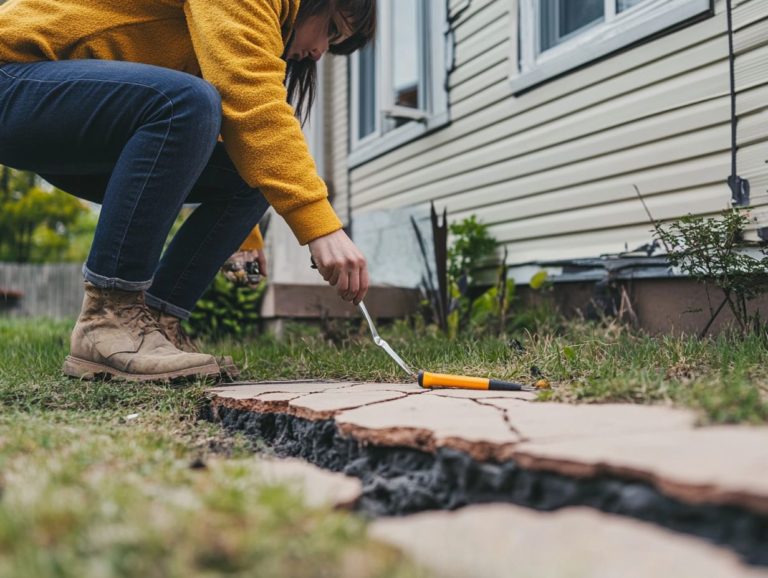Common Mistakes First-Time Home Buyers Make
Purchasing your first home can be an exhilarating yet daunting experience. It s easy for first-time home buyers to become swept up in the excitement, which can sometimes lead to avoidable missteps.
From underestimating the total cost of homeownership to overlooking essential steps such as inspections and neighborhood research, these common pitfalls can swiftly transform your dream into a nightmare.
This article illuminates the most frequent mistakes that new buyers tend to make and provides valuable insights to help you navigate the home-buying journey with confidence and ease.
Contents
- Key Takeaways:
- 1. Not Understanding the Full Cost of Homeownership
- 2. Not Getting Pre-Approved for a Mortgage
- 3. Skipping the Home Inspection
- Why Resale Value Matters Don’t Overlook It!
- Don’t Fall in Love with a House Before Securing Financing
- Establish a Realistic Budget
- Research the Neighborhood and Community
- 8. Not Negotiating for a Better Price
- 9. Overlooking Hidden Costs and Fees
- 10. Not Considering Future Needs
- 11. Not Understanding the Home Buying Process
- 12. Not Having a Contingency Plan
- 13. Not Working with a Real Estate Agent
- 14. Making Emotional Decisions
- 15. Not Being Patient and Rushing into a Purchase
- What Are the Benefits of Working with a Real Estate Agent?
- Frequently Asked Questions
- What are some common mistakes first-time home buyers make?
- Why is budgeting important for first-time home buyers?
- What is pre-approval and why is it important?
- What should first-time home buyers research before making a purchase?
- What costs should first-time home buyers consider?
- Can working with a real estate agent help avoid common mistakes?
Key Takeaways:

- Understand the full cost of homeownership before making a purchase to avoid financial strain.
- Get pre-approved for a mortgage to know your budget and have a better chance at securing your dream home.
- Always get a home inspection to avoid costly repairs and ensure the property is a good investment.
1. Not Understanding the Full Cost of Homeownership
Understanding the true cost of homeownership includes various ongoing costs that first-time home buyers often overlook in their emotional decision-making process. This encompasses property taxes, mortgage payments, and closing costs.
You also need to consider regular expenses such as homeowners insurance, which protects you from potential damages. Maintenance costs may also crop up unexpectedly as your property ages.
Don t forget about utilities electricity, water, and gas can significantly impact your monthly budget. It s essential to factor these elements into your financial planning.
By crafting a comprehensive budget that accounts for all these expenses, you gain a clearer picture of what you can truly afford. This clarity empowers you to navigate your new responsibilities with confidence and ease.
2. Not Getting Pre-Approved for a Mortgage
Failing to secure a mortgage preapproval can significantly limit your ability to act swiftly in a competitive market. Preapproval shows you re financially ready and familiar with various loan options, including FHA loans (Federal Housing Administration loans).
Going through the preapproval process clarifies your budget and enhances your bargaining position. When sellers see that you have preapproval, they re more inclined to negotiate favorably, recognizing you as a serious contender.
Acting fast for preapproval can snag you better interest rates, directly impacting your monthly payments and the total cost of the loan.
Choose a reliable mortgage lender, ideally one with positive reviews and transparency regarding fees. Working with a trusted lender provides valuable insights and helps you navigate the complexities of mortgage options with ease.
3. Skipping the Home Inspection
Don t skip a home inspection it could save you from costly repairs later! Skipping an inspection can lead to costly surprises, especially for first-time home buyers who often let emotions steer their decisions without fully grasping potential hidden issues in a property.
This emotional investment can cloud a logical assessment of structural integrity, plumbing problems, or electrical concerns issues that could significantly impact long-term homeownership expenses. By prioritizing a thorough inspection, you gain peace of mind and a clearer financial picture of owning the property.
Overlooking these crucial evaluations can result in unexpected repair costs that strain your finances, making it essential to approach your home purchase with both heart and mind.
Taking the time for an inspection ultimately safeguards your future, ensuring that your dream home doesn’t turn into a hidden nightmare.
Start your journey today get pre-approved and explore your options!
Why Resale Value Matters Don’t Overlook It!
Ignoring the potential resale value of a home can lead to costly oversights, especially for first-time homebuyers who might be too emotionally invested in their purchase. It’s crucial to consider how market trends and neighborhood dynamics could impact your investment over time.
Understanding the local real estate market is essential. Shifts in neighborhood desirability, school quality, and proximity to shopping and recreational areas can significantly influence a home’s future value. Be mindful of property taxes and compare them with nearby homes to gain insight into long-term affordability.
To effectively assess a property’s resale potential during your buying journey, consider these steps:
- Research comparable sales in the area.
- Consult with real estate professionals for expert insights.
- Look at what’s happening in the housing market right now to make informed decisions that align with your financial goals.
Don’t Fall in Love with a House Before Securing Financing
Falling for a house before getting your financing in order can lead to hasty decisions that strain your finances. As a first-time homebuyer, it s easy to overlook the importance of getting a thumbs up from the bank for your loan before you start house hunting.
This crucial step helps you set a realistic budget and gives the power to you in negotiations, signaling to sellers that you mean business.
Once your financing is in place, you can approach earnest money deposits confidently, knowing you have the resources to follow through. These deposits demonstrate to the seller your commitment to purchasing the property.
Without a clear understanding of your financial capabilities, you risk losing both the home of your dreams and the money you’ve invested as earnest money.
Establish a Realistic Budget
Failing to create a realistic budget can jeopardize the home-buying process, leading to stress from unexpected ownership costs, closing costs, and the impact of credit reports on your loan approval.
To ensure a smoother transition into homeownership, it s crucial to account for every aspect of your budget. This means considering not just your mortgage payments, but also recurring property taxes and ongoing maintenance costs that often slip through the cracks.
Understanding these financial commitments will help you avoid unwelcome surprises down the road. By collaborating closely with a mortgage lender, you can gain valuable insights into your credit report, clarifying how your credit score impacts loan terms and interest rates.
By thoroughly reviewing these factors, you ll be better positioned to create a realistic budget and make informed choices that truly reflect your financial situation.
Research the Neighborhood and Community

Neglecting thorough neighborhood research can lead to less-than-ideal decisions as a first-time homebuyer. The environment you choose significantly affects homeownership costs, property values, and overall quality of life.
Understanding neighborhood dynamics is essential, as various factors like property taxes can greatly influence your budgeting and overall affordability. If you have children or plan to, the quality of local school districts becomes pivotal; strong educational institutions can elevate property demand and even enhance resale value.
Safety is another critical consideration. A low crime rate often correlates with higher property values, while choosing an unsafe area can lead to depreciation. Community amenities like parks and shopping centers enhance your living experience and help maintain or boost property values over time.
By keeping these aspects in mind, you’ll make smart choices that pay off in the long run!
Start your journey today by doing your homework!
8. Not Negotiating for a Better Price
Many first-time homebuyers often overlook potential savings by not negotiating for a better purchase price. This typically happens due to emotional decisions that cloud their judgment during the buying process. To help navigate these challenges, it’s beneficial to review common questions first-time buyers ask.
To get a better price, it s essential to understand the current housing market. Carefully assess fluctuations in home values and prevailing trends.
By staying informed, you can approach negotiations with confidence and leverage homebuyer rebates that could further reduce your expenses.
Having a seasoned real estate agent by your side can make a world of difference. These professionals possess the expertise to handle tough negotiations and advocate effectively on your behalf.
Being informed and having a good agent can save you a lot of money.
9. Overlooking Hidden Costs and Fees
Don’t overlook hidden costs! They can drastically impact your budget as a first-time homebuyer, potentially leading to unexpected financial strain. To navigate this successfully, be aware of common mistakes to avoid when selling your home.
These often-overlooked expenses can include appraisal fees, which are essential for accurately determining the property’s value, as well as inspection fees that help you identify potential issues before sealing the deal.
You also need to factor in ongoing maintenance costs. These can accumulate rapidly if you re not adequately prepared.
It s crucial to weave these expenses into a comprehensive budget plan. Ensure you allocate funds for repairs, routine maintenance, and any unforeseen emergencies that might crop up.
By anticipating these hidden financial demands, you can pave the way for a more realistic and sustainable homeownership experience.
10. Not Considering Future Needs
Failing to consider your future needs can lead to regrettable home-buying decisions. As a first-time homebuyer, you might easily overlook how your lifestyle, family size, or budget constraints could evolve over time. To navigate these challenges, it’s important to know how to avoid common mortgage pitfalls.
It s crucial to anticipate the potential impacts of life events, such as starting a family, changing jobs, or even relocating for new career opportunities. These factors can greatly affect what you can afford and what you want in a home.
For instance, while a cozy starter home may feel perfect today, a growing family could soon require more space, leading to expensive renovations or an inconvenient move.
Think ahead about your future needs. By thoughtfully evaluating these possibilities, you can make more informed decisions that satisfy your current needs and align with your aspirations.
This proactive approach ultimately paves the way for a more fulfilling homeownership experience.
11. Not Understanding the Home Buying Process
A lack of understanding of the home buying process can be a significant hurdle for first-time homebuyers, leaving you unprepared for the complexities that come with working with mortgage lenders. To navigate these challenges, it’s crucial to know the top 10 questions first-time home buyers should ask when evaluating loan options based on your credit report.
Your journey begins with securing pre-approval. A lender reviews your financial standing and creditworthiness, helping you establish a realistic budget.
It s essential to maintain open communication with lenders. Voicing any questions or concerns about loan options ensures clarity every step of the way.
Next comes the exciting phase of house hunting, where you ll weigh various factors like location, amenities, and budget constraints. Once you identify a suitable property, negotiations kick in, leading you to the contract phase.
Throughout these stages, regular contact with your mortgage lenders offers vital insights. This will help you close smoothly on your dream home.
12. Not Having a Contingency Plan
Not having a contingency plan can leave you vulnerable to unforeseen issues during the home buying journey, such as surprises uncovered in a home inspection or complications with your mortgage lender.
By establishing clear contingencies, you can navigate potential hurdles with greater ease. For instance, a home inspection contingency gives you the power to negotiate repairs or even walk away from the deal if significant problems arise.
This ensures you don t end up pouring money into a property that requires extensive renovations.
Similarly, a financing contingency acts as your safety net. It guarantees that you can secure a loan with favorable terms; if that doesn t happen, you can gracefully withdraw without any penalties.
Including a contingency about the sale of your existing home safeguards you against unexpected financial burdens, providing peace of mind as you progress through the transaction.
13. Not Working with a Real Estate Agent
Choosing not to work with a real estate agent could prove to be a costly oversight for you as a first-time homebuyer. These professionals are invaluable allies, guiding negotiations and helping you navigate the emotional maze that often accompanies such a significant purchase.
With their extensive market knowledge, real estate agents can pinpoint properties that match your needs and budget, empowering you to make more informed decisions. They bring a wealth of expertise to the table, ensuring you don t overpay or miss critical issues within a property.
The emotional rollercoaster of buying a home can be daunting. An experienced agent offers the support you need during those challenging moments. From managing paperwork to addressing your concerns, they help alleviate the common hurdles first-time buyers face, making your journey smoother and far less stressful.
14. Making Emotional Decisions

Making emotional decisions during the home buying process can lead to financial regret. As a first-time homebuyer, you might find yourself overlooking budget constraints and the future costs of owning a home tied to your choices. To avoid these pitfalls, consider following some home inspection tips for first-time buyers.
This lack of clarity can cloud your judgment, steering you toward risky investments or properties that fail to meet your practical needs. You may be captivated by a property s charm or emotional allure, forgetting to evaluate crucial factors like location, future resale potential, and maintenance expenses.
To counteract these tendencies, it’s essential for you to establish a clear budget beforehand and stick to it rigorously. Crafting a checklist of must-have features will help you maintain a more rational perspective when assessing each property.
This approach keeps your emotions in check while negotiating prices. It enables you to make informed decisions.
15. Not Being Patient and Rushing into a Purchase
Rushing into a purchase can often lead to decisions you’ll regret as a first-time homebuyer. You might find yourself caught up in emotional choices and financial commitments, like initial payments, without fully grasping their implications. To avoid such mistakes, be aware of the common pitfalls in home selling.
It s crucial for you to cultivate a patient mindset throughout the home-buying journey. This process typically requires thoughtful consideration and thorough research. By taking your time to evaluate properties, you significantly lower the risk of future dissatisfaction.
Key strategies to consider include:
- Visiting multiple homes to compare features and values,
- Scrutinizing online listings for photos and descriptions,
- Conducting neighborhood research to assess local amenities and market trends.
Consulting with real estate professionals and seeking advice from experienced friends can also provide invaluable insights. Ultimately, taking a methodical approach empowers you to make a well-informed decision, ensuring that your choice aligns not just with your immediate desires, but also with your long-term goals.
What Are the Benefits of Working with a Real Estate Agent?
Working with a real estate agent offers you a wealth of advantages as a first-time homebuyer. You gain access to expert negotiation skills, valuable market insights, and guidance on managing the costs of homeownership, all of which contribute to a smoother buying experience.
These professionals have access to exclusive listings that aren t typically on the public radar, giving you a broader selection tailored to your specific needs. Their expertise in negotiating deals can lead to substantial savings, ultimately helping you secure a more favorable purchase price.
Real estate agents also provide crucial support with closing costs, easing the financial transition and making it less daunting. This collaborative approach not only simplifies the complex process of buying a home but also builds your confidence, ensuring you make well-informed decisions as you navigate the exciting journey to homeownership.
What Are Some Common Hidden Costs in Home Buying?
Hidden costs in home buying can catch you off guard. These can significantly impact your overall expenses if you don t consider them carefully during the purchase.
These expenses often include home inspection fees, which can range from a few hundred dollars to well over a thousand. Appraisal fees also contribute to your initial outlay.
You might overlook property taxes. These can vary dramatically based on location and property value, adding a substantial amount to your monthly budget.
To prepare for these hidden costs, create a comprehensive budget that accounts for these expenses. Allow a buffer for any unexpected fees.
Engaging in a conversation with a real estate agent can provide valuable insights into local costs. This ensures you have a clearer financial outlook as you navigate this journey.
What Should First-Time Home Buyers Look for in a Neighborhood?
As a first-time homebuyer, consider various factors when researching neighborhoods. Think about property taxes, community amenities, safety, and how these elements fit into your future lifestyle and needs.
One important aspect is the quality of local schools. This can significantly influence property values and family dynamics.
Also, consider how accessible public transportation is. It can enhance your commute and overall convenience, making daily life smoother.
Local services everything from grocery stores and healthcare facilities to parks and recreational centers are vital. Ensure that all your necessities are nearby.
Take the time to explore neighborhood reviews and visit during different times of the day. Engage in conversations with current residents for insights that may not be readily available online.
How Can First-Time Home Buyers Avoid Overpaying for a House?
Start by researching the market to avoid overpaying for a house. Understand loan estimates and employ effective negotiation strategies with your mortgage lender.
Examine recently sold properties in your desired area. This helps establish fair market values and identify comparables to determine a reasonable offer.
Understanding the details of loan estimates, such as interest rates and closing costs, empowers you to make informed decisions that align with your financial goals.
With this knowledge, you ll be in a strong position to negotiate favorable terms. Aim for lower interest rates or reduced closing costs to ensure you land a deal that suits your budget and needs.
What Are Some Common Contingencies in a Home Buying Contract?
Common contingencies in a home buying contract, particularly related to home inspections and financing, are essential for safeguarding your interests as a first-time homebuyer.
These contingencies serve as a safety net and help reduce the risks associated with investing in a property. For example, appraisal contingencies ensure that the home’s value aligns with the agreed-upon purchase price.
Inspection contingencies allow you to assess the property s condition before sealing the deal. This helps you spot urgent repairs or issues that need attention.
Together, these contingencies provide security and flexibility. They transform the often-overwhelming home buying journey into a more manageable experience.
Frequently Asked Questions

What are some common mistakes first-time home buyers make?
Common mistakes first-time home buyers make include not budgeting properly, not getting pre-approved for a mortgage, and not researching the neighborhood and potential home. To avoid these pitfalls, it’s important to be aware of common mistakes to avoid when applying for a mortgage. They often overlook additional costs like closing fees and maintenance expenses.
Why is budgeting important for first-time home buyers?
Budgeting is important for first-time home buyers because it helps determine their price range and what they can realistically afford. It also allows them to save for a down payment and factor in other expenses like property taxes and homeowners association fees.
What is pre-approval and why is it important?
Pre-approval is when a lender checks your financial information and credit score. This helps determine how much money you can borrow for a mortgage.
It s important because it shows sellers that you are serious about buying a home and have the financial backing to do so.
What should first-time home buyers research before making a purchase?
First-time home buyers should look into the neighborhood, schools, and property values. Understanding potential resale value is also crucial.
Additionally, check for any zoning or development plans that might affect your property in the future.
What costs should first-time home buyers consider?
First-time home buyers need to think beyond the purchase price of the home. Closing fees, property taxes, homeowners insurance, and maintenance costs can add up quickly.
Make sure to include these expenses in your budget for a clearer picture of your financial commitment.
Can working with a real estate agent help avoid common mistakes?
Yes! A good real estate agent can guide first-time home buyers through the process.
They recommend reliable lenders, help negotiate fair prices, and provide insights about the local market.






